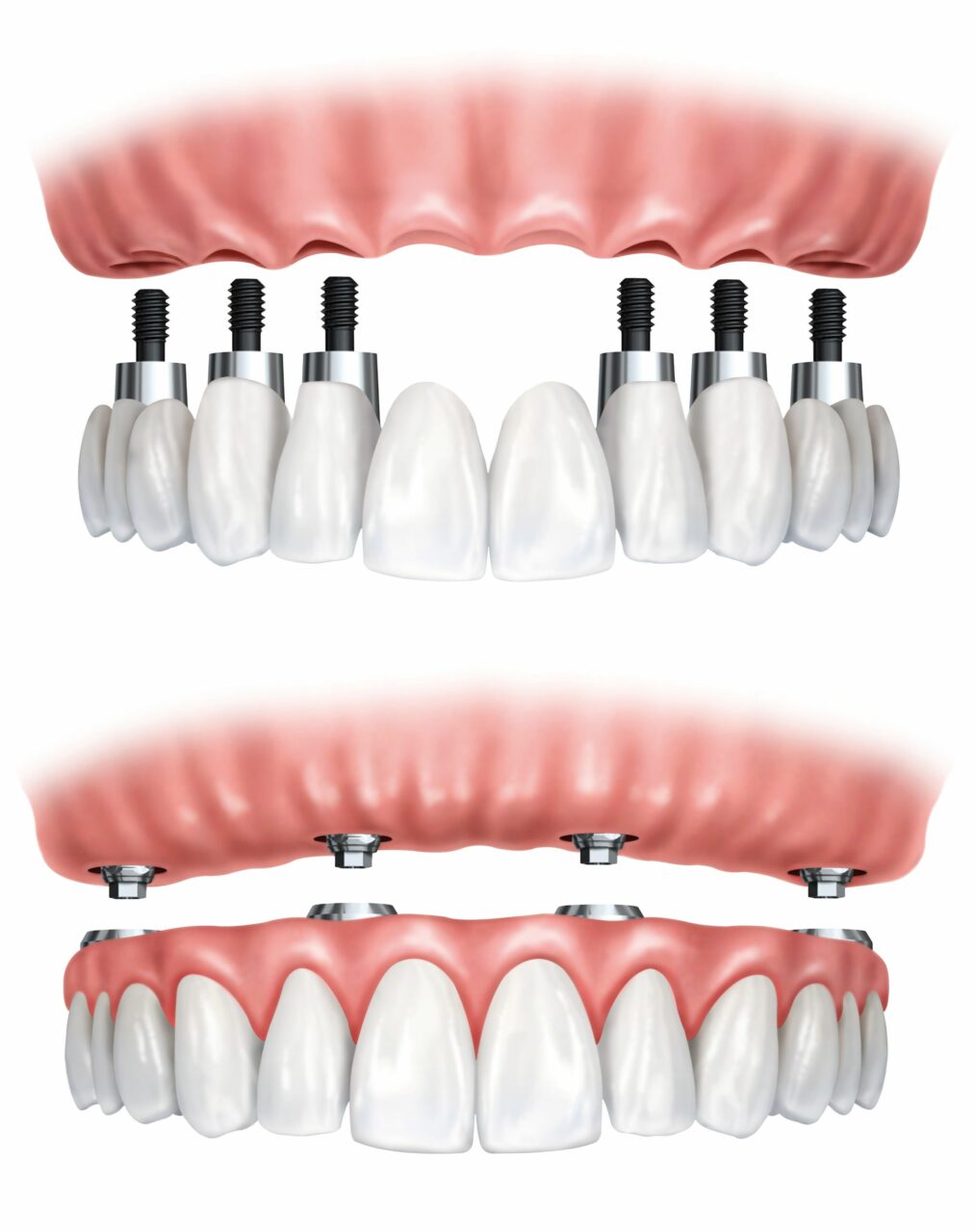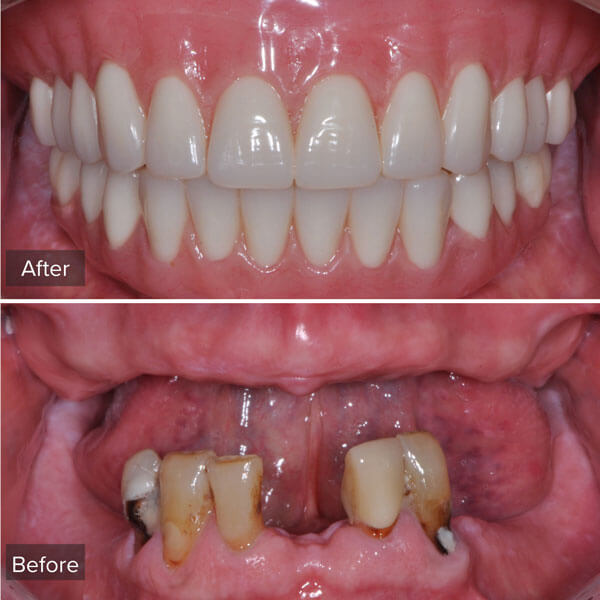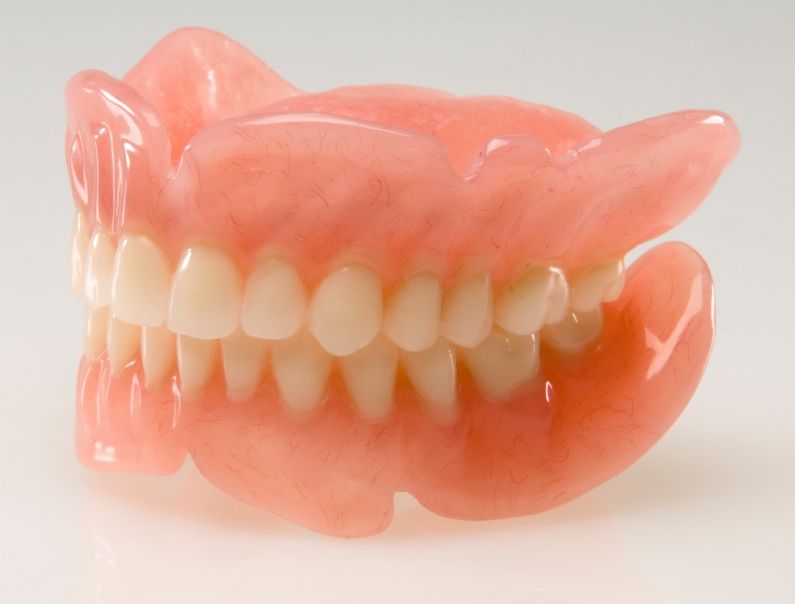
Implant Dentures vs Traditional Dentures
There are various options when it comes to rehabilitation of your complete mouth. There are various options as normal dentures and implant supported dentures. In some ways implant-supported dentures surpass traditional dentures, while in other cases the opposite is true.
Whether implant-supported dentures or traditional dentures fit better with your lifestyle, it is important to weigh your options and educate yourself on each choice.
What are Traditional Dentures?
Traditional dentures are made from an acrylic base attached to a set of artificial teeth. They float on top of the gums and can be easily removed for cleaning. Since they are not attached to the jawbone, traditional dentures may shift as you eat or talk creating challenges that natural teeth do not have. Some of the complications associated with traditional dentures include trouble eating, mouth sores, discomfort and problems talking.
Another complication with traditional dentures is bone loss. Sitting on top of the gum, it does not stimulate the underlying bone. Over time, the jawbone will begin to decay. This can lead to premature aging and a sunken, hollow appearance.
With proper cleaning and care acrylic dentures last about five to ten years.

What are Implant-Supported Dentures?
Implant-supported dentures address many of the issues and challenges of traditional ones. They will not move while eating or talking. Dental implants are the only form of tooth replacement that stimulates bone growth, rather than allowing the jaw to atrophy.
An implant is a titanium screw that replaces the tooth root. The implants are embedded directly into the jawbone, providing an extremely stable foundation for an individual crown or a full denture appliance.
The denture itself is still made from acrylic. However, rather than floating on the gum, the appliance hooks onto the implants using a latching system. As a result, the denture functions exactly like normal teeth and will not move during eating or talking.
Implant-supported dentures can be either removable or permanent, depending on your preferences:
- Removable: Removable dentures affix to conventional dental implants, mini-implants or a bar that is connected to the implants. They can be easily removed for cleaning at night or following meals.
- Non-Removable: These dentures attach permanently to the implant. You can clean them by brushing and flossing, exactly like regular teeth. Although they are permanent, they can be removed by a dentist if necessary, without damaging the implant.
Denture Choices: Implant-supported vs. Traditional
Dentures vary in performance as well as appearance.
- Conventional dentures rely on dental adhesive and mouth muscles to stay in place. They sit on the gums, resting on the bone.
- Implant-supported dentures use the bone for support.
- Implant-supported dentures work by placing four/six implants into the upper or lower jawbone. A support bar usually accompanies these implants. Once the titanium implants have fused with the bone, the dentist will then place the permanent denture.
Things to Consider When Choosing Dentures; Effect on the Bone
- Conventional dentures sit on the bone. Since the bone is not being used, it begins to deteriorate. Bone density is lost and any future ability to use the jaw fades away.
- Inversely, implant dentures have a positive effect on the jawbone. The screws that are inserted into the jaw act like artificial tooth roots, keeping the jawbone alive and in use. For this reason, implant-supported dentures prevent the sunken facial appearance that can come from a loss of jawbone volume.

Chewing Ability
Implant-supported dentures are directly attached to the bone and supported by the implants in the bone, which gives the wearer the ability to chew a wide variety of foods. The bite force can be stronger with implant dentures, allowing the patient to chew on many foods that traditional dentures may not allow.
The conventional denture has various restrictions over food because they are not held in place with implants. The maximum bite force while wearing conventional dentures is much lower. This means you have to be a little more careful when eating while wearing traditional dentures.
Speaking and Smiling
The stability provided by implant-supported dentures allows for easier speaking and enunciation of words, whereas traditional dentures might cause a subtle lisp since they are not as well attached. Both dentures will need to be removed each night to remove the bacteria and give the mouth a break.
Implant-supported dentures appear more natural than traditional dentures. Adhesive-supported dentures can fall throughout the day and become uneven.
Are you Currently Considering Dentures?
If you are currently in need of dentures and are considering implant-supported dentures, we invite you to contact ‘Smile Delhi – The Dental Clinic’ to schedule a consultation with our team of specialists and help you determine which type of dentures is right for you.

To book an appointment with us in, ‘Smile Delhi – The Dental Clinic’– call us on +91-9811106871 or whatsapp Dr. Suprriya B Bhatia on +91-9811106377. You can also mail us on [email protected]
“We Care To Make You Smile”
Posted by: Dr Hema






























































